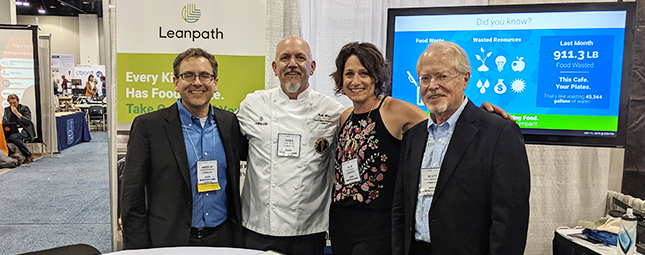5 food waste trends from the 2019 NACUFS National Conference

The National Association for College and University Foodservice (NACUFS) hosted its National Conference last week in Denver, Colorado. Thousands of C&U foodservice professionals gathered in common pursuit of operational excellence. Leanpath was front and center as their trusted food waste prevention partner.
We did a lot of listening while greeting folks at the Leanpath booth, walking the expo floor and attending educational sessions. Here are some of our top takeaways for food waste trends in College and University foodservice from NACUFS 2019.
Food waste prevention improves employee retention
Labor was a hot topic at NACUFS this year, and a common issue across all foodservice segments where annual employee turnover averages over 70%. Kitchen staffing in C&U is further complicated by student workers' changing schedules. Giving employees a sense of meaning in their work is paramount to satisfaction and retention - but it can be hard for a chef or manager to keep staff engaged while meeting high production demands. By directly involving staff in automated food waste prevention, colleges create purpose-driven opportunities with genuine environmental and social impact while also improving kitchen efficiency.
Students demand sustainable foodservice on campus
Universities are full of loud voices - from students to faculty, parents, alumni, and administration - and they're demanding sustainable practices everywhere, including residential and retail dining. Leanpath works with universities to bridge the gap between kitchens and the communities they serve with Leanpath Spark, our smart signage solution that displays food waste statistics in real time - and uses behavioral science to encourage diners to take what they need and be mindful of the social and environmental impact of food waste. Mom would approve.
Marketing food programs to students is challenging
Whether it's preventing overproduction or excessive trim waste waste in the back of house or changing behavior on the guest’s side of the serving line, food waste prevention initiatives are a powerful marketing opportunity for colleges. Preventing waste appeals to the increasing demand for sustainable food options from prospective and current students, and data-driven tools like Leanpath’s create research opportunities for both students and faculty. In the collaborative NACUFS community, chefs and dining services directors are happy to share success stories with one another. That’s why we work with over 300 colleges to help tell those stories every day.
Check out what your colleagues have been up to here.
University-wide sustainability commitments impact dining halls
Not surprisingly, we heard there’s a lot of pressure to keep up with growing sustainability demands on C&U foodservice. As more universities strengthen their commitment to sustainable overall operations, a proactive approach to food waste is becoming a must-have. Leadership matters, whether it’s saving the planet or improving operations by a few percentage points. We were humbled to be included in the safe space of people’s conversations around this issue as they stopped by our NACUFS booth.
Tons of diversion. Need for prevention.
Universities are doing a great job of diverting food waste from landfills by donating, composting, or using digestors to deal with waste once it's created. We applaud those efforts - but are they enough?
Leanpath CEO Andrew Shakman commented on the issue of food waste diversion in colleges and universities in a recent talk at the 25th annual Chef's Culinary Conference at the University of Massachusetts, Amherst.
"When we create a seemingly safe place to put food waste, we in some ways excuse it. Similarly, when we donate overproduced food, or compost everything that can't be consumed, we create structures that are dependent on food waste, forcing us to overproduce just to donate, turning our teams into philanthropists with our food dollars."
Please continue to find socially impactful ways to divert the waste you create - but we love working with our C&U partners to save the energy, labor, and food costs that went into creating it in the first place!
The community of driven foodservice professionals that NACUFS brings together every year at the national conference, and at regional events, is a huge source of inspiration for us at Leanpath. We look forward to continuing to serve you as food waste prevention partners.
To follow our tradeshow attendance and get the latest international food waste prevention news, subscribe to the Leanpath monthly newsletter.
